Ethical Reasoning in Action to launch decision-making study
Featured Stories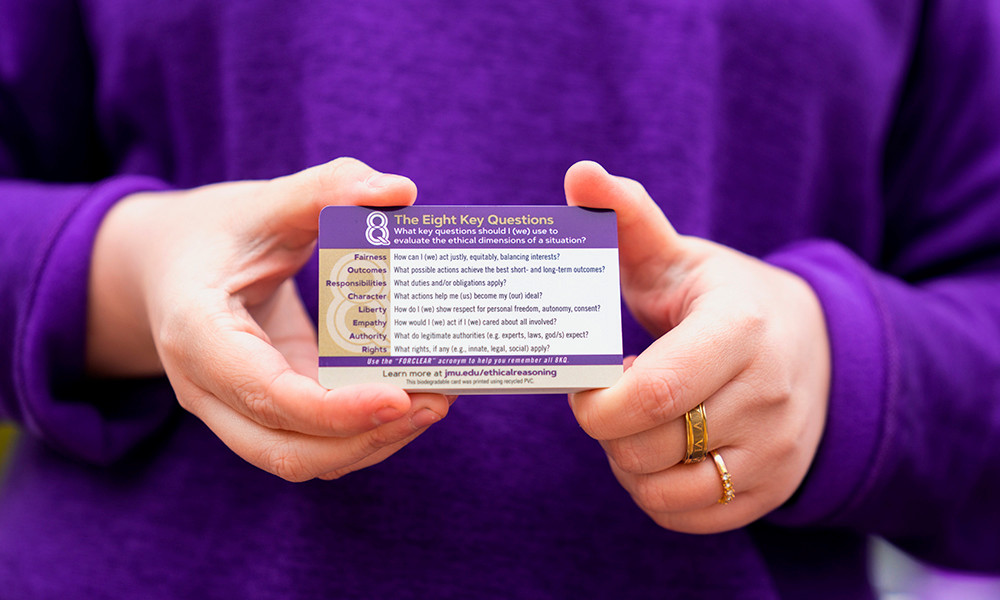
SUMMARY: Ethical Reasoning in Action is working with its first research fellow, psychology professor Dr. Daniel Holt, to study the impact of its Eight Key Questions strategy around campus. A uniquely JMU decision-making strategy, the 8KQ has the potential to advance ethical-reasoning efforts in business and higher education around the country.
For more than a decade, Ethical Reasoning in Action has challenged students and program attendees alike to improve the quality of their decision-making by adopting a unique and powerful ethical reasoning strategy — the Eight Key Questions.
The 8KQ strategy brings awareness to the ethical values at stake in any given situation by focusing on eight considerations: fairness, outcomes, responsibilities, character, liberty, empathy, authority and rights. Now, ERiA is looking to make its 8KQ strategy available to other institutions while researching how the strategy could benefit Dukes in their everyday lives.
“To the best of my knowledge, it’s the most sophisticated ethical reasoning strategy that is out there,” said Dr. Christian Early, professor of philosophy and director of ERiA. “It’s certainly the most assessed. And now we’re building out a research arm, exploring possibilities for putting moral perception and moral decision-making under the microscope, and looking at the difference that an Eight Key Questions strategy would make. This promises to be a significant contribution to our understanding of ethical reasoning and connects to other research that has already been done.”
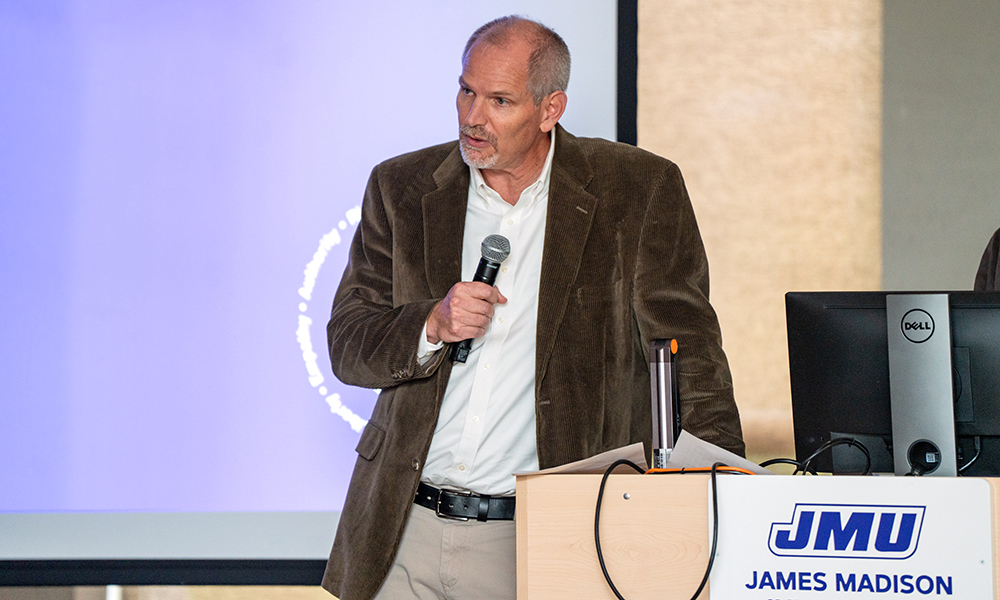
Launched in 2013 by Dr. William “Bill” Hawk, professor emeritus of philosophy and founding director of ERiA, the 8KQ strategy provides a question-raising approach to ethical reasoning that Early said was novel.
“The uniqueness of this to JMU is really important,” Early said. “Every so often, people ask, ‘What are you doing at JMU that no other institution does? The honest answer is that the Eight Key Questions is one of maybe two things on that list. It is truly unique and singles JMU out in a very distinct way. It is our stamp, our own contribution. You can’t get this ethical reasoning strategy anywhere else, but you can get it here.”
***
To kick off its campus-based research, ERiA has enlisted its first research fellow, Dr. Daniel Holt, professor of psychology, to conduct research on factors related to decision-making, with a focus on ethical reasoning.
Holt’s goal is two-pronged: First, study skill development around the ethical reasoning strategy (the “what” to do), and second, help people know when to use it effectively (the “when” to do it).
“We would argue that you should use this skill all the time,” Holt said. “Because we should always be considering these ethical reasoning skills in our lives. That’s true to a point, but there are also moments in our lives where we have to recognize when to use the skill in a clear way.
“The second line of research is sort of that perceptual piece of recognition,” he said. “Most moments go by. We don’t recognize the ethical situation, but are we seeing those ethical situations?" Here, Holt’s research is really two major components of "What do people naturally see," and then, "Can we train people to see things differently?" Once people see the ethical situation, Holt wants to know if they have the skill set to employ in that moment to deal with what they just saw.
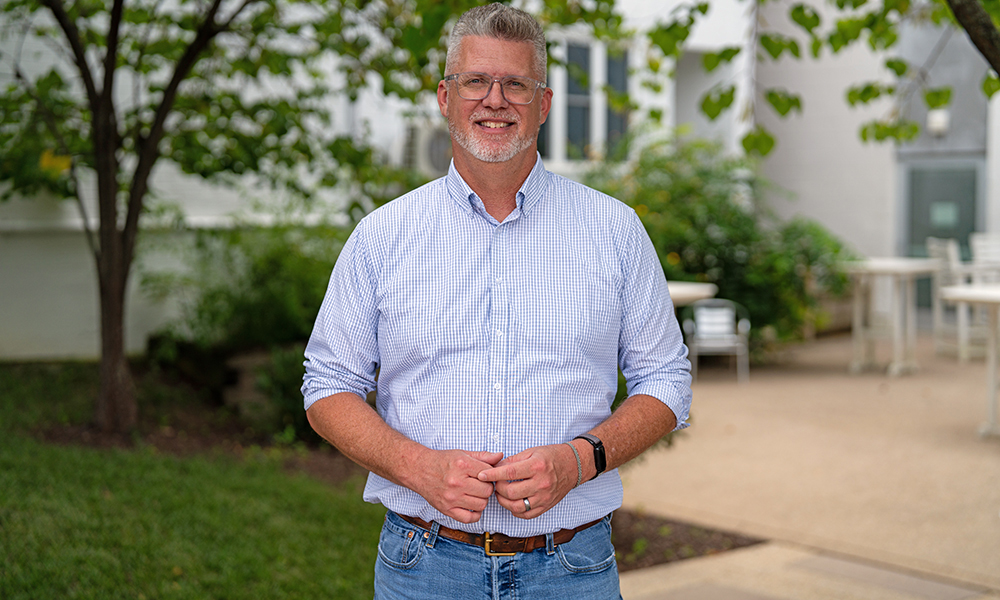
|
Holt’s research team will document how participants notice social encounters, even if they don’t necessarily define them as ethical situations. As volunteers participate in the study, they’ll be asked to push a button to mark what they deem as important moments when observing a social encounter, so researchers can record which moments in a scenario might stand out to people in general. “As you’re paying attention to these moments,” Holt said, “[it’s] not just asking them, ‘Did you see the ethics?’ [It’s] just saying, ‘Did you notice something?’”
Eventually, the goal will be to discover how those with training in ethical reasoning skills are making these connections in various situations. “We’re going to find out how people are making sense of that sort of social-meets-ethical scenario, and are they seeing the ethical issue?” Holt said. “And whether or not they’re seeing it is important from an experimental perspective.” From there, JMU researchers can identify how people are making sense of their world. “And then, regardless of how they’re seeing the world, what happens when you get some training on recognizing that moral tug or the moral moment? Do they see it now?”
***
What has made the 8KQ strategy unique is not only how it’s challenged people to consider the ethics of various situations but also how the yearslong assessment process has strengthened the outcome for future participants.
“At the time Bill [Hawk] was developing the Eight Key Questions, assessment was built into the process from the very beginning,” ERiA Assistant Director Kacey Damaty (’10, ’11M) said. “We’re the only university teaching ethical reasoning this way. There are other institutions that are teaching ethics and ethical reasoning differently, but no one is doing it the way we do it at JMU, so they can’t really assess it the same way that we do.”
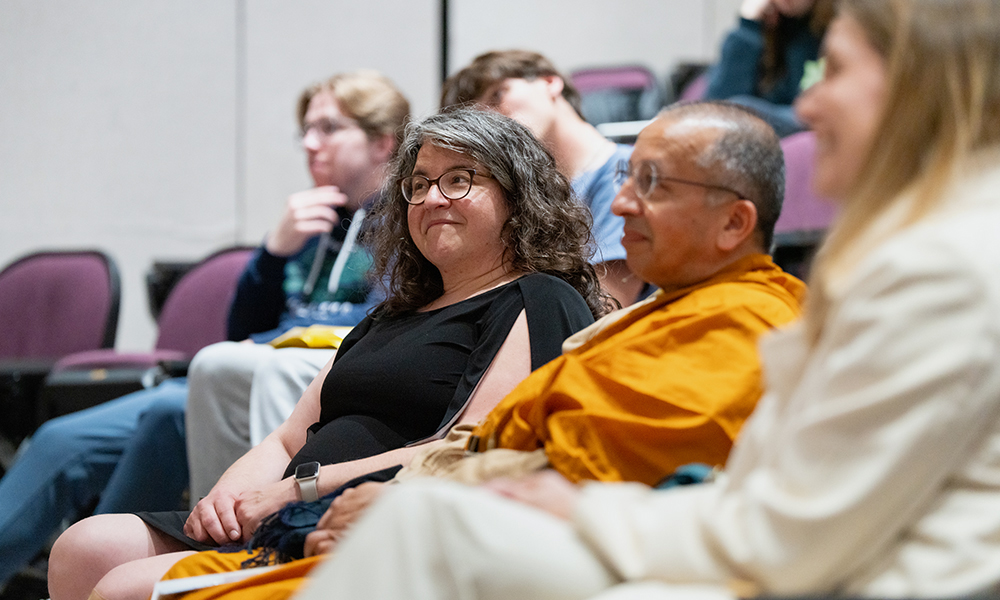
Describing JMU’s approach to research as groundbreaking, Early said it’s focused on getting to the core of moral perception and whether people recognize a moral situation as it’s happening. “We’re really in a unique position to develop these lines of research,” he said.
Teaching the 8KQ in his philosophy classes, Early quickly began to realize its benefits in the lives of his students. “At the beginning of the semester, they would say, ‘Nothing ever happens in my life. My life is boring. I don’t have moral situations.’ That’s the perception, right? ... By the middle of the semester, after using the 8KQ every week, they would be going on about their roommates, about laundry, about a family member that they need to go visit, but they have other commitments too ... I mean, it was moral situation after moral situation.”
“I knew anecdotally that using the Eight Key Questions changes how you perceive your everyday life,” Early said, “but I didn’t have a good way of putting it into hard data. That’s what we’re doing with Dan [Holt]. ... Hopefully we’re going to discover whole new things that we never even thought about. We’re going to let the research guide us; the findings will guide us. It has to be an empirical process, but we’re quite hopeful about what we’re going to find.”
***
In addition to presenting the 8KQ strategy, ERiA offers various programs that include It’s Complicated, the annual online orientation designed for all new students; Initi8: Improving Ethical Reasoning at Scale, an intensive, five-day in-person institute that ERiA cohosts with the Center for Assessment and Research Studies; and the Elev8 Ethics speaker series.
“The primary mission has always been focusing on students and teaching this to incoming students,” Damaty said of 8KQ. ERiA developed It’s Complicated in 2013 as Madison’s signature orientation program, delivering and measuring it in partnership with CARS.
ERiA was the result of JMU’s 2010-20 Quality Enhancement Plan. Additionally, part of the implementation of the QEP included embedding the 75-minute, in-person training into orientation programming. This signature program, the only one nationwide that includes the 8KQ, continued until 2021 when it moved online. Since then, it’s become a yearly asynchronous training for all incoming students.
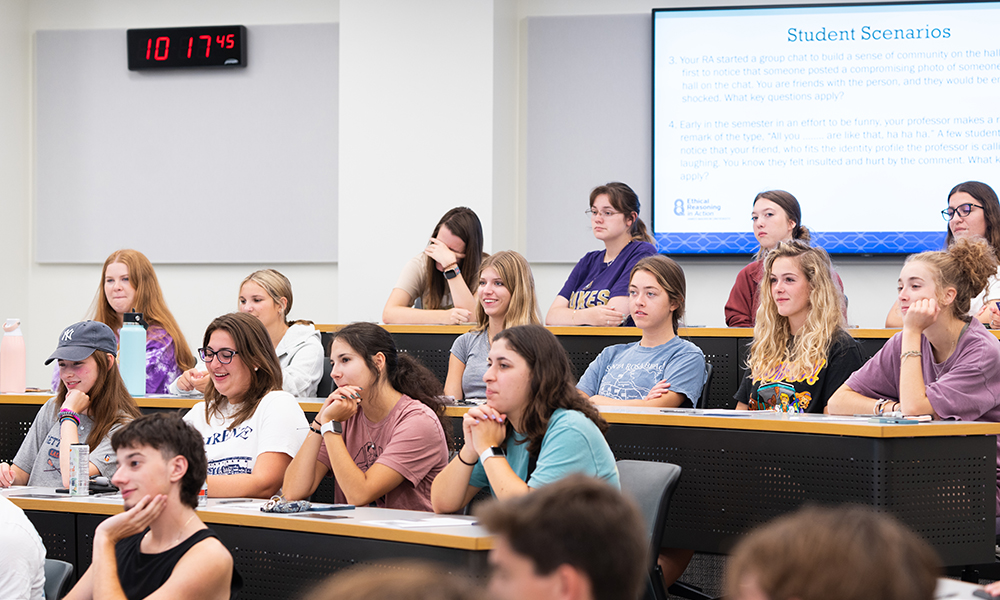
Other ERiA projects have included a partnership offering training courses through the School of Professional and Continuing Education and coordination through James Madison Innovations Inc. to copyright and trademark the 8KQ strategy, and then license its work to an outside company, Ethical Decision Making, to broaden the impact of 8KQ. EDM implements the use of the strategy in a professional development setting within the corporate world. The revenue generated by EDM comes back to support JMU in the form of licensing fees and the innovators in the form of royalties.
“We’re not the psychological experts,” Damaty said. “We’re not the engineering experts; we’re not the education experts. We’re the ethical reasoning experts. We rely on collaboration. When somebody says, ‘Hey, I want to integrate ethical reasoning,’ great, tell us about what you do; let’s talk about how ethical reasoning can fit in. We have this potential with this fellowship position to have a beautiful kaleidoscope of how ethical reasoning applies or can impact research in really any area that cares to partner with us, which I think is really unique outside of JMU.”
To promote the 8KQ more widely, Early said the ERiA team will attend more national and regional conferences, including the Southern Association of Colleges and Schools Commission on Colleges Annual Meeting. In speaking at conferences and publishing their findings in journals, they will also add to the professional literature about ethical reasoning. “Those are all ways in which we’re trying to get the word out,” Early said.
Having a Quality Enhancement Plan is a key component of college accreditation, and Early said that ERiA hopes to offer a solution that other institutions might find attractive — “an ambitious academic project backed by assessment that can be implemented in a very cost-effective way.”
To learn more, visit JMU Ethical Reasoning.

